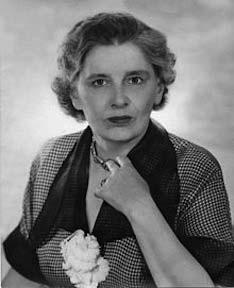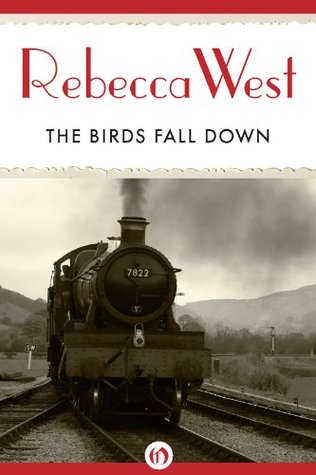The Birds Fall Down by Rebecca West (1966)
By Taylor Jasmine | On May 16, 2016 | Updated September 30, 2022 | Comments (0)

When The Birds Fall Down by Dame Rebecca West was first published in 1966, it was hailed as a novel of great ambition that rose above the genre of spy fiction. The story was inspired by a true story she heard in her youth, told by fellow author Ford Maddox Ford, whose sister married a Russian refugee.
From the first pages, intrigue sets the tone, as West’s skillful prose urges the reader to turn the pages of this ponderous novel set against a backdrop of the Russian Revolution.
The Birds Fall Down was reissued by Virago Press in 2000 with this succinct description of its plot:
“One afternoon, in an early summer of this century, eighteen-year-old Laura Rowan sits on the garden steps of her house embroidering a handkerchief. She overhears a conversation between her father, an English Member of Parliament, and her mother, Tania, the daughter of an exiled Russian royalist.
Tania’s decision to take Laura to Paris to visit her grandfather, Count Nikilai Diakonov, means that Laura will unwittingly become a witness to the momentous events leading up to the Russian Revolution.
Through a vivid canvas layered with intrigue, conspiracy and murder, Rebecca West has created a story that is at once a family saga, a political thriller, a philosophical drama and a historical novel.”
A 1966 review of The Birds Fall Down in the New York Times by Frederic Morton, sets up the plot:
“A half-English girl of eighteen named Laura visits her grandfather, Count Diakonov, opulently exiled in fin-de-siecle Paris. Old Diakonov philosophizes amid malachite vases, cloisonne jardinieres, rosebushes made of coral, and furnishings to match.
They are the sort of things that bloom at Parke-Barnet but choke a novel. In this milieu dialogue is uttered rather than spoken; at times you suspect it to be lifted stiffly from a Constance Garnett translation of some Tolstoy imitator.
As Laura and her grandfather embark on a journey you can’t help feeling that the story itself is going absolutely, if baroquely, nowhere. But don’t underestimate Dame Rebecca. The moment old Diakonov has left the house, an oddly intriguing note creeps into his garrulity. He is no longer muffled by too much interior decor.
Furthermore, you sense that the author — whose forte has always been the undomestic — also feels liberated. Diakonov’s words lose their stilts but not their grandeurs. His ruminations on why he was exiled, in what ways the French are decadent, and how to hunt the mountain cock, all flow together into the portrait of a totally unregenerate and rather irresistible reactionary.”
. . . . . . . . . .

Learn more about Rebecca West
. . . . . . . . . .
An English girl caught up in a web of spies
From the 1966 Viking Press edition of The Birds Fall Down by Rebecca West: Rebecca West’s completely absorbing novel is quite different from any of her others. Set at the turn of the twentieth century, it uses the ingredients of an international spy thriller for thoughtful probing into timeless human motives.
More than that, it tells us something about how modern history has been made. A foreword explains that the story was suggested by actual events slightly transposed in time and place.
It is known now that one Azeff, who became the chief spy for the Tsarist Secret Police, was also head of the battle organization of the Social Revolutionary Party.
Tsarists and aristocrats
A confrontation in a railway carriage, similar to the one in this novel, is recorded in memoirs of the time, and the outcome changed the course of history — it helped pave the way to Lenin’s rise to power.
The story is told through a half-English girl of eighteen, Laura Rowan, whose father is an M.P and whose grandfather, Count Nikolai, is an exiled Russian aristocrat living in Paris, still passionately loyal to his Tsar.
While she is on a train journey with him in northern France, the grandfather is confronted by the tsar’s arch-enemy, a terrorist searching for the truth about an apparent double spy.
This confrontation and the jeopardy in which it puts Laura precipitate a series of dramatic events in which she is deeply involved. The cold-blooded murder toward which it all leads is a master stroke of irony.
. . . . . . . . . .

See also: Black Lamb and Grey Falcon by Rebecca West
. . . . . . . . .
Period details of the fin-de-siecle
Dame Rebecca has brought her characters to life not only in their speech but in her loving period detail: the whiskers, the clocks, the carriages, dresses, and jewels — the whole fin-de-siecle atmosphere in which they are so much at home.
Count Nikolai is a wonderful tall figure of an old aristocrat. The double spy — if he is one — wins our sympathy as the lost soul we feel him to be even when he looks blackest to those through whose eyes we see him.
Laura’s beautiful mother, the daughter of Nikolai, has all the charm of her flighty helplessness; her husband is the very proper M.P. with a roving eye. And young Laura, struggling through her ordeal, holds our sympathy to the end.
Abundantly comic, sometimes hilarious, always moving forward with suspense and serious purpose, the story charms both in its own right and by the originality and witty grace of its telling.
. . . . . . . . .
. . . . . . . . .

Leave a Reply